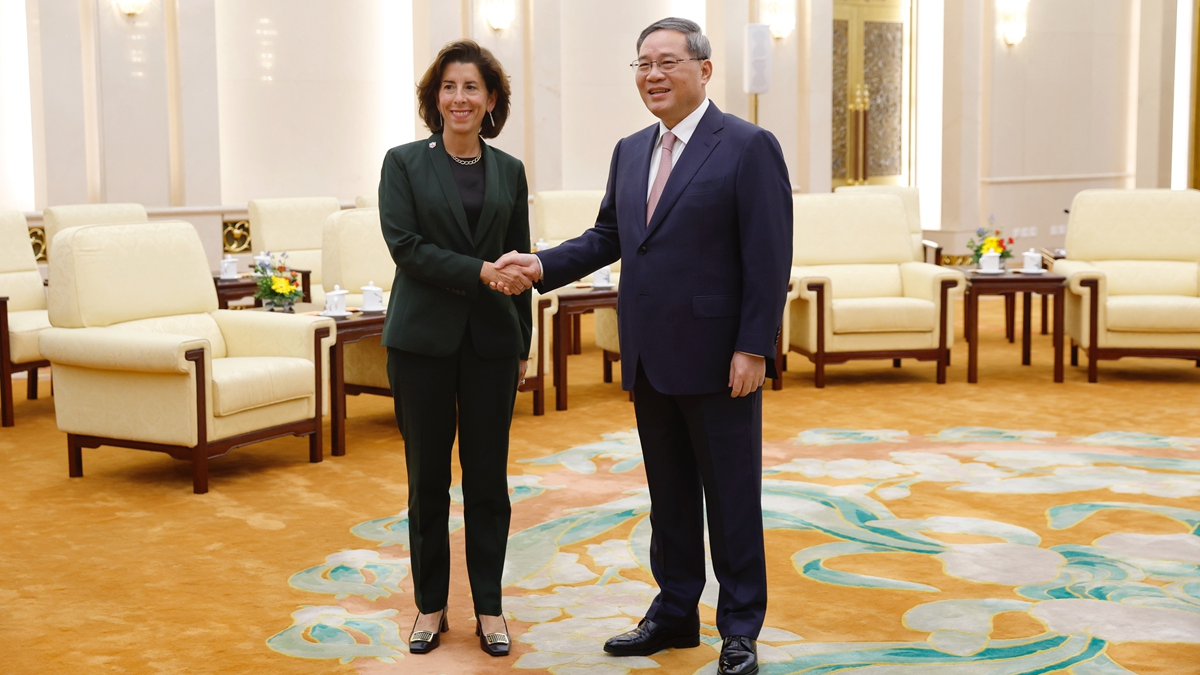
Chinese Premier Li Qiang shakes hands with U.S. Commerce Secretary Gina Raimondo at the Great Hall of the People in Beijing, China, August 29, 2023. [Photo/Xinhua]
By James Rae
U.S. Commerce Secretary Gina Raimondo met with at least three senior Chinese officials including Premier Li Qiang, Minister of Commerce Wang Wentao, and Minister of Culture and Tourism Hu Heping on August 28 to 29. Raimondo will also visit Shanghai after her stay in Beijing. Three timelines are apparent in her trip.
First, Raimondo's visit represents a recent trend of sending politically pragmatic American officials who have generally positive views toward globalization and economic interdependence. Following Secretary of State Antony Blinken, the visits of climate adviser John Kerry and Treasury Secretary Janet Yellen demonstrate a consistent theme of diplomatic engagement and commercial dialogue. The United States even took some small steps to show goodwill by removing export control restrictions on over two dozen Chinese firms leading up to the meetings.
These trends and Raimondo's visit provide a pathway to normalize trade relations and reduce confrontation to areas where the United States has claimed a "small yard" on national security fencing. It also foreshadows expected encounters of Chinese and American heads of state in the second half of this year on the sidelines of international gatherings for the Association of Southeast Asian Nations or Group of 20.
Could it even signal a pathway to formal visits between Chinese President Xi Jinping and his U.S. counterpart Joe Biden in the future? That timeline certainly offers some hope to resuscitate stagnant China-U.S. relations.
But, as always, slivers of hope offer some light to a pathway toward more harmonious ties. Indeed, Raimondo's meetings with Premier Li Qiang, Commerce Minister Wang Wentao and others led to agreements to form a working group on commercial issues at relatively senior levels and hold a "travel and tourism summit" in early 2024.
Another timeline is reflected in the ongoing U.S. policymaking toward China that maintains its hawkish approach. Through acts of Congress, executive orders, and new rules from federal agencies, the United States is making it clear that its national security suspicions of China are deep and comprehensive, and aim to sidetrack China's military modernization as well as its economic vitality. Microchips, semi-conductors, and a host of software technologies used in artificial intelligence are off limits to China; these technologies are of course fundamental to a modern economy and particularly for innovation.
Clearly, the U.S. foreign policy consensus is to maintain its hegemony and stifle China's rise. Tariffs are still in place since the Donald Trump administration, along with the variety of rules which deny Chinese firms' access to American capital markets and divest China of certain American investment funds. Section 301 tariffs still undermine the bilateral relationship.
Earlier this month, the Biden administration declared a "national emergency" on sensitive technologies in its plans to curb investment in China. This set of policy pronouncements come on almost a weekly basis, driving a wedge in an already growing chasm.
The American electoral season has begun, and will last for the next 14 months. China was targeted repeatedly in the first Republican debate, where the idea of a "new Cold War" was taken for granted. Representatives from Congress are already criticizing Raimondo's visit and any of the affirmative agreements reached during the several day visit.
This calendar will make it more difficult to even continue the recent entreaties to China represented by visits from Yellen, Kerry, and now Raimondo. Both parties will want to strike a tough posture toward China, which will serve to reduce the chances of goodwill and engagement at the top levels heading into a contested election. It's highly likely that China will be faced then with reciprocal policy actions, such as restricting American firms like chipmaker Micron operating in China.
More visits are good, and we can see what outcomes result from Secretary Raimondo's trip. In the end, China's calls for win-win solutions and reducing confrontation help soothe the frayed ties and prevent the outbreak of true adversarial relations. Hope springs eternal.
James Rae, a special commentator on current affairs for CGTN, is a professor of politics and the director of the Asian Studies Program at California State University, Sacramento.

 中文
中文



